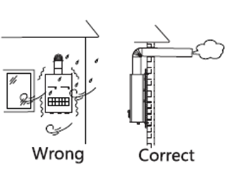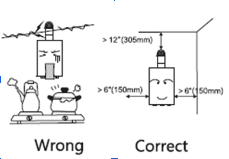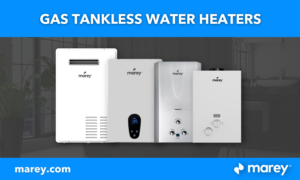Are you tired of bulky and space-consuming traditional water heaters taking up precious real estate in your home?
It’s time to switch to a tankless water heater!
Not only are tankless systems more energy-efficient, but they also take up significantly less room.
In this post, we’ll share our top tips for finding the perfect place for a tankless water heater and maximizing the space available.
Get ready to enjoy hot showers without sacrificing valuable square footage!
Benefits of installing a tankless water heater
- Tankless water heaters can help save space since the unit doesn’t require a storage tank.
- Tankless water heaters provide endless hot water, so you’ll never have to worry about running out.
- They’re very energy-efficient, saving you money on utility bills.
Factors to consider before installation
The first factor to consider before installing a tankless water heater is the type of unit you need. Electric and gas models are available, so be sure to choose the one that best fits your needs.
The next thing to consider is the size of the unit. This will be determined by the amount of hot water you use. Once you have selected the right model and size for your home, it is time to install it.
The location of your tankless water heater and the space available in the room are important.
Finally, make sure to read the manufacturer’s manual. These manuals are quick reads and will give you all the info you need about your tankless water heater, from warranty to maintenance.

Factors to consider when choosing a location for your tankless water heater
Here are some things to keep in mind when choosing the location for your tankless water heater:
- Consider whether you want an indoor or outdoor unit. Outdoor units are typically more expensive, but they offer the advantage of not taking up valuable space inside your home.
- Another important factor is the climate in your area. If you live in an area with cold winters, it’s important to choose a location that won’t be susceptible to freezing temperatures, which can damage your unit.
- Remember to keep your unit away from natural elements, like strong winds and rain.
- Also, only outdoor units can be placed outside.
- Another thing to consider is the proximity of other appliances or fixtures that use hot water. The closer your tankless water heater is to these fixtures, the more efficient it will provide hot water.
- Finally, you’ll need to consider access to gas or electricity, as tankless water heaters require either one of these utilities to function properly.
Where should you place a tankless water heater in house?
- It should be placed where it is easily accessible for maintenance and repairs.
- It should also be placed where it will not be in the way of foot traffic or other objects in the room.
- The tankless water heater should be placed against a wall to provide support and stability.
- Make sure there is adequate ventilation around the unit. This will help prevent the build-up of fumes and ensure that the unit operates safely.
Example of clearances for a gas unit.

What you should not put near a tankless water heater
Flammable materials
Flammable materials should be kept away from tankless water heaters for obvious safety reasons. This includes things like cleaning supplies, paint thinners, and other chemicals. If these materials come into contact with the water heater’s heated elements, they could catch fire and cause serious damage.
In case of gas units, anything that could block ventilation
This includes things like cabinets, shelves, and closets. Blocking the vents prevents the water heater from proper combustion, venting, and heating. This can lead to corrosion and other problems over time.
Anything that could cause corrosion
This includes metal objects or furniture. The moisture in the air around the tankless water heater can cause metals to rust or corrode if left in contact for too long. So, it’s best to keep them out of the way to avoid damage.
Professionals to install the tankless water heater
Although these units are relatively easy to install and set up, contacting a professional can be the best option. This is important, as improper installation can lead to serious problems down the road.
Professionals will be able to install everything according to building codes and ensure all the needed dos and don’ts are followed to a t.
Conclusion
Installing a tankless water heater in your home can efficiently maximize space and save money on utility bills.
With the right setup, you can enjoy hot water whenever you need it without cluttering up your home



